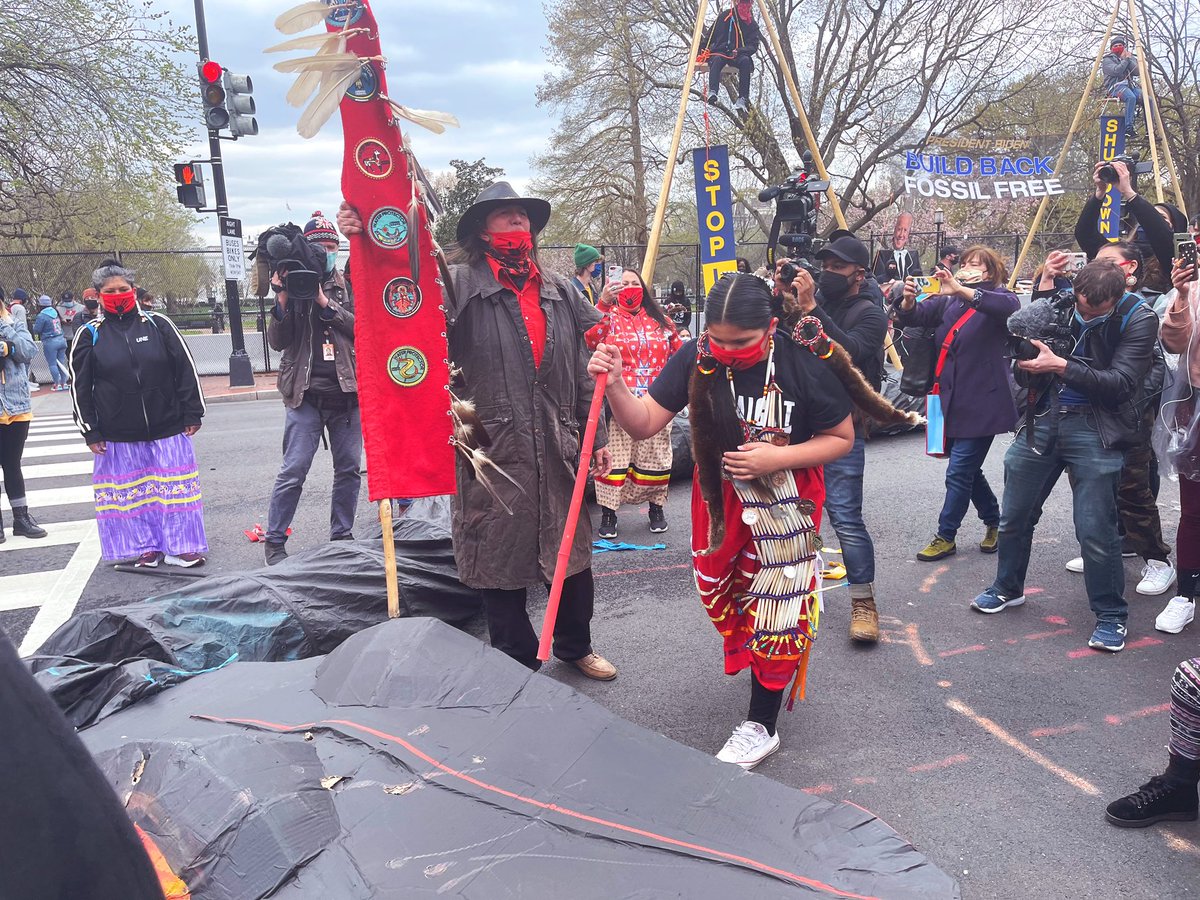Native teens take ‘black snake’ to D.C. streets

Love Hopkins, 11, of White Shield, N.D., puts a finishing stab on the 300-foot effigy of a black snake as tribal youth returned to the U.S, capital five years after their first relay run to demand tribal consultation in petroleum pipeline and other megaproject permitting. (Photo Courtesy)
By Talli Nauman, Native Sun News Today Health & Environment Editor
WASHINGTON, D.C. – Love Hopkins, 11, of White Shield, N.D., and Silas Neeland, 13, of Rice Lake, Minn., were among scores of Native youth water protectors from the Upper Midwest who pounded the pavement for environmental justice in the U.S. capital April 1, launching a nationwide Week of Action.
The date was the fifth anniversary of the founding of the initial grassroots spirit camp that drew others like it and unprecedented international attention to the Standing Rock Sioux Tribe’s lawsuit against the U.S. Army Corps of Engineers for permitting the Dakota Access Pipeline.
Demonstrators here converged in a rally at Corps of Engineers headquarters and planted a 300-foot-long effigy of a black snake representing a pipeline. They presented Corps personnel with boxes of petitions to stop DAPL and Line 3. Then, to the sound of a drum song, they staged a die-in by a poster saying, “Biden, Army Corps, your inaction, our death.”
With the mantra “We’re giving the fossil fuel snake back to D.C.,” they later smashed the snake likeness to bits outside the White House.
Their underlying mission: Remind President Joe Biden that their communities’ campaign support for his recent election stemmed from hopes of his Administration’s help in requiring free, prior, and informed consent for pipelines and other megaproject developments in ancestral treaty territory.
Interviewed during the event, Hopkins recalled taking part in a similar convergence at the capital in 2016, when youth relay runners travelled here from the Cheyenne River and Standing Rock Sioux Indian reservations to raise awareness of the DAPL project’s threat to their drinking water intake just downstream from the pipeline’s Missouri River crossing.
“I was 6 years old whenever we came here,” Hopkins said, noting that a number of the runners in the relay also took part in this latest initiative. “It doesn’t feel good to be here protesting for our water, because we shouldn’t have to live in fear,” she said.
“We shouldn’t have to fight for our own water. We should be able to have drinking water whenever we want because this land is ours and those guys over there took it away from us,” she said, with a nod to the abundance of federal officials and symbols in the capital.
Neeland, who recalled five years of involvement in resistance to the Enbridge Line 3 construction across the Upper Mississippi River, mused, “You know, people complain about paying $7 for gas. We’ll be paying $7 for a bottle of water if we don’t stop this pipeline.”
The first camper at the Sacred Stone Camp near the DAPL route, Cheyenne River Sioux tribal member Joye Braun sent a message that her daughter Morgan Brings Plenty read at the rally. “We will not stop till DAPL is shut down and all these pipelines, like Line 3, are stopped. I look forward to the time when the injustices are righted,” the message said.
In it, Braun thanked the youth and asked participants to remember the sacrifices made during the years of Native frontline resistance to the pipelines, including Keystone XL, Enbridge’s Mountain Valley, and its Line 5.
Braun is among grassroots organizers asking pipeline opponents to contact Mandan, Hidatsa and Arikara Nation Tribal Business Chair Mark Fox about his campaign plank “Water is more valuable than oil,” in the wake of his March 23 letter asking the Corps for “immediate consultation on the alternatives being considered regarding continuity of operations of operations of the Dakota Access Pipeline” while the permit is under court-ordered review.
Fox notes in the letter that more than half of the oil produced on his Ft. Berthold Indian Reservation goes to market via DAPL, making the Three Affiliated Tribes “unique among other tribes in our region.”
Cheyenne River Sioux tribal members Oscar High Elk and Jasilyn Charger, who are facing fines and incarceration for an alleged felony and misdemeanors during Keystone XL resistance, took the podium after Brings Plenty.
“I am here today to ask the President, Biden, for a pardon on my charges, my false bogus charges, and I encourage you all to sign the petition to drop the charges,” High Elk said.
Charger, who said she created The 7th Defenders project for environmental conservation “because youth were not being heard,” pronounced, “These are all black snakes. These are all affecting our people. We will stand together as relatives, as one. This is our land. We cannot trespass on stolen land.”
Standing Rock Youth Council hosted the event with help from the Indigenous Environmental Network and support from the Great Plains Action Society. Emphasizing the importance of reducing energy use and dependence on petroleum products, they posited:
“Climate chaos is here. We cannot wait, we need [Biden] to #BuildBackFossilFree. Host a #BuildBackFossilFree solidarity action before the 9th. “If the President is serious about addressing the climate crisis, he must keep fossil fuels in the ground and invest in the communities that have borne the brunt of pollution and climate disaster,” they said.
(Contact Talli Nauman at talli.nauman@gmail.net)
The post Native teens take ‘black snake’ to D.C. streets first appeared on Native Sun News Today.
